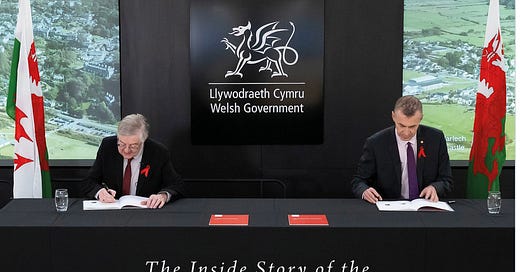I was pleased to write the Foreword to the new book by John Osmond on the Labour-Plaid Cymru Co-Operation Agreement from 2021-24. As I say in the Foreword, it is not a review, and had it been I would have said that I would like to hear other perspectives from within both Plaid and Labour on this period of government. The copy runs as follows:
From memory, the first time I met John Osmond was around 1990 when his TV production company, Agenda, was filming a programme about the campaign to get funding for Gaelic Language television in Scotland into the 1990 Broadcasting Act. I was coordinating the parliamentary aspects of the campaign at the time. But I had been reading the writings of the ‘old warhorse’, as he calls himself in this book, for far longer: probably since around 1980 when he and others set up the radical magazine Arcade in the aftermath of the failed 1979 devolution referendum. Newly resident in London, I kept in touch with what was happening in Wales through publications like Arcade and others.
John has been a writer, think-tanker, activist and latterly a political adviser throughout the devolution journey and a journalist for decades before. He’s been as much workhorse as warhorse, as his output has been prolific, and he helped to shape the Institute for Welsh Affairs into an important institution in Welsh public life. The present book continues his intellectual adventure in the unexplored regions of the devolved world, combining anthropological investigation of the dynamics of the Plaid group in the Senedd through the ‘fieldwork’ of six months of his personal diary, with reflections on Welsh political leadership in the fraught period after Brexit. He notes the ‘the often circular, mind numbing, time wasting character of professional politics’ and the ways on which day-to-day events in the Senedd can distract from a party’s overall strategy. I particularly enjoyed his analysis of the relationship of the speech-writer to their principal, as he described the process of working on speeches for Adam Price.
The book is an original examination of the Co-operation agreement between Welsh Labour and Plaid Cymru which endured from 2021 until the middle of 2024: something which Price himself has described as ‘Co-Opposition’, which John adopts for his title. That tells you immediately that the perspective of the book is John’s perspective, his take on the events in which he was involved. There will, doubtless, be other accounts and interpretations of that period, and I look forward to reading those. But this is the first attempt to address them.
John’s interpretation sits very clearly in the tradition of his previous writings since the 1980s, and the general theme can perhaps be summarised in one simple passage:
If Labour has become more politically Welsh, Plaid has had to face the reality that building the nation involves engaging with the greater part of the country and not just those regions where it feels most at home.
He refers to Plaid’s traditional role, as he sees it, of pushing Labour in a more radical pro-devolution direction. As I said, this is John’s interpretation: it would not be mine, and others will have their own views.
That being said, the book gives a fair-minded account of the development of the Co-operation agreement after the realities of Brexit and Covid knocked Plaid’s strategy of leading a Welsh Government after the 2021 Senedd elections off-course. John identifies the significant role of Mark Drakeford and Adam Price as the leaders of the two parties, and doubts that, without them, the agreement could have happened at all. He notes the need for the agreement in the face of the much more aggressive and strategic ‘muscular unionism’ of the Conservatives at Westminster, seeking to halt devolution’s ‘forward march’. John ends by looking forward to possible further co-operation between a Welsh Labour led by Eluned Morgan and Plaid Cymru under Rhun ap Iorweth’s leadership, and wonders how devolution will develop with Labour in power in Westminster.
The book will have interest to politics scholars, as well as students of Welsh history. The kind of Co-operation Agreement that transpired after 2021 is one which has only been tried in a few other territories and never before in the UK: in academic language, it is known as ‘Contract Parliamentarianism’. John reminds us that following its announcement, the Presiding Officer of the Senedd, Elin Jones MS, had to take legal advice as to whether Plaid Cymru could still be regarded as an independent political Group in the Senedd, or whether they should be regarded as part of the Welsh Government. He also acknowledges that Plaid had hoped for ministerial positions.
John puts much of the development of the Agreement in historical context. He looks back to the Richard Commission, published twenty years ago in 2004, in his consideration of the size of the Senedd. In discussing one of the economic policy ambitions of the Agreement, from Plaid’s position, he looks back on the abolition of the Welsh Development Agency during Rhodri Morgan’s ‘bonfire of the quangoes’ and rehearses his and others’ criticism of that. It is not a perspective I share but it is useful to be reminded of that side of the argument in contemporary terms. Similarly, he reflects on the making of the Welsh Baccalaureate during the first Assembly and what he believes to be the resistance of civil servants. Overall, John considers the Agreement in the context of the history of Plaid-Labour co-operation in the Assembly and Senedd since 1999.
There have been all too few reflective writings on the political practice of devolution in Wales. John has added an important additional volume. This is part of the story of the making of Wales since 1999. It is a story we are still writing and still making.




